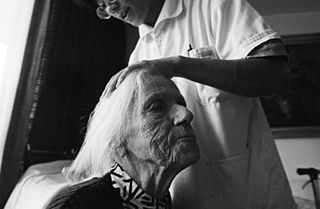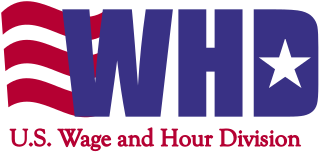
Home care is supportive care provided in the home. Care may be provided by licensed healthcare professionals who provide medical treatment needs or by professional caregivers who provide daily assistance to ensure the activities of daily living (ADLs) are met. In-home medical care is often and more accurately referred to as home health care or formal care. Home health care is different non-medical care, custodial care, or private-duty care which refers to assistance and services provided by persons who are not nurses, doctors, or other licensed medical personnel. For patients recovering from surgery or illness, home care may include rehabilitative therapies. For terminally ill patients, home care may include hospice care.
Overtime is the amount of time someone works beyond normal working hours. The term is also used for the pay received for this time. Normal hours may be determined in several ways:

A salary is a form of periodic payment from an employer to an employee, which may be specified in an employment contract. It is contrasted with piece wages, where each job, hour or other unit is paid separately, rather than on a periodic basis. Salary can also be considered as the cost of hiring and keeping human resources for corporate operations, and is hence referred to as personnel expense or salary expense. In accounting, salaries are recorded in payroll accounts.

The Equal Pay Act of 1963 is a United States labor law amending the Fair Labor Standards Act, aimed at abolishing wage disparity based on sex. It was signed into law on June 10, 1963, by John F. Kennedy as part of his New Frontier Program. In passing the bill, Congress stated that sex discrimination:
A full-time job is employment in which workers work a minimum number of hours defined as such by their employer.
The term sheltered workshop refers to an organization or environment that employs people with disabilities separately from others, usually with exemptions from labor standards, including but not limited to the absence of minimum wage requirements.

In the United States, the minimum wage is set by U.S. labor law and a range of state and local laws. The first federal minimum wage was instituted in the National Industrial Recovery Act of 1933, signed into law by President Franklin D. Roosevelt, but later found to be unconstitutional. In 1938, the Fair Labor Standards Act established it at 25¢ an hour. Its purchasing power peaked in 1968, at $1.60 In 2009, it was increased to $7.25 per hour, and has not been increased since.

The Fair Labor Standards Act of 1938 29 U.S.C. § 203 (FLSA) is a United States labor law that creates the right to a minimum wage, and "time-and-a-half" overtime pay when people work over forty hours a week. It also prohibits employment of minors in "oppressive child labor". It applies to employees engaged in interstate commerce or employed by an enterprise engaged in commerce or in the production of goods for commerce, unless the employer can claim an exemption from coverage. The Act was enacted by the 75th Congress and signed into law by President Franklin D. Roosevelt in 1938.
Garcia v. San Antonio Metropolitan Transit Authority, 469 U.S. 528 (1985), is a landmark United States Supreme Court decision in which the Court held that the Congress has the power under the Commerce Clause of the Constitution to extend the Fair Labor Standards Act, which requires that employers provide minimum wage and overtime pay to their employees, to state and local governments. In this case, the Court overruled its previous decision in National League of Cities v. Usery, in which the Court had held that regulation of the activities of state and local governments "in areas of traditional governmental functions" would violate the Tenth Amendment to the United States Constitution.

The Wage and Hour Division (WHD) of the United States Department of Labor is the federal office responsible for enforcing federal labor laws. The Division was formed with the enactment of the Fair Labor Standards Act of 1938. The Wage and Hour mission is to promote and achieve compliance with labor standards to protect and enhance the welfare of the Nation's workforce. WHD protects over 144 million workers in more than 9.8 million establishments throughout the United States and its territories. The Wage and Hour Division enforces over 13 laws, most notably the Fair Labor Standards Act and the Family Medical Leave Act. In FY18, WHD recovered $304,000,000 in back wages for over 240,000 workers and followed up FY19, with a record-breaking $322,000,000 for over 300,000 workers.
Paraprofessional Healthcare Institute, Inc. (PHI) is a non-profit organization based in New York City that works to improve long-term services and supports for elders and individuals with disabilities, as well as improve the job quality of the direct-care workers who provide those services whether in people's homes or in nursing homes and other institutional facilities.
The elaws Advisors are a set of interactive, online tools developed by the U.S. Department of Labor to help employers and employees learn more about their rights and responsibilities under numerous Federal employment laws. They address some of the nation's most widely applicable employment laws, offering easy-to-understand information on areas such as:

Wage theft is the failing to pay wages or provide employee benefits owed to an employee by contract or law. It can be conducted by employers in various ways, among them failing to pay overtime; violating minimum-wage laws; the misclassification of employees as independent contractors; illegal deductions in pay; forcing employees to work "off the clock", not paying annual leave or holiday entitlements, or simply not paying an employee at all.
We Can't Wait is a policy initiative launched by the U.S. President Barack Obama's administration in October 2011 to institute policies by executive orders, administrative rulemaking, and recess appointments. The initiative was developed in response to the United States Congress' unwillingness to pass economic legislation proposed by Obama, and conflicts in Congress during the 2011 debt ceiling crisis.

Employer compensation in the United States refers to the cash compensation and benefits that an employee receives in exchange for the service they perform for their employer. Approximately 93% of the working population in the United States are employees earning a salary or wage.
The Eldercare Workforce Alliance (EWA), a project of the Tides Center, is a coalition of 35 US national organizations that came together to focus on short- and long-term healthcare workforce issues relating to older adults. The Alliance helped pass the 2018 Raise Family Caregivers Act, supports ongoing funding for the Title VII Geriatrics Workforce Enhancement Program, and advocates for including elder care in government and professional policies, including related questions of educating and maintaining the labor force such care requires.
Long Island Care at Home, Ltd. v. Coke, 551 U.S. 158 (2007), is a US labor law case, concerning the minimum wage.
Encino Motorcars v. Navarro, 579 U.S. ___ (2016), 584 U.S. ___ (2018), was a Supreme Court of the United States case addressing overtime pay. Specifically at issue is whether automotive service advisors are eligible for overtime pay under the Fair Labor Standards Act.
California's Assembly Bill 1066, Phase-In Overtime for Agricultural Workers Act of 2016, was authored by Assemblymember Lorena Gonzalez Fletcher and was signed by Governor Jerry Brown on September 12, 2016. This bill allows farmworkers in California to qualify for overtime pay after working 8 hours in a single day or 40 hours in a workweek. Prior to the passage of AB 1066, farmworkers were only eligible for overtime pay after working 10 hours.

Keith E. Sonderling is an American lawyer and government official. He currently serves as a Commissioner on the Equal Employment Opportunity Commission, previously serving as Vice Chair. He was confirmed by the Senate on September 22, 2020. Prior to the EEOC, he served as the Acting and Deputy Administrator of the Wage and Hour Division of the United States Department of Labor. Before joining the government in 2017, he practiced Labor and Employment Law at the Florida-based Gunster Law Firm in West Palm Beach, Florida.